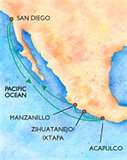With the new USA regulations to implement Passports as travel identification, I'm sure if you're anything like me you can easily get confused. As a cautionary measure I say you have plenty of time and just apply for a passport if you don't have one. And if you DO have a passport,DOUBLE CHECK your expiration date, your passport must be valid for at least six months after the last day of travel. For information about obtaining a passport for the first time, or about renewing a passport, "
click" here to visit the U.S. Department of State's Web site.
Last year, I had to assist my girlfriend’s college daughter in getting a new passport because her passport did not have the valid 6 month window for her travel period. The waiting period was unrealistic for our needs (long wait) and the last minute ordeal & stress was truly not a way to start off a trip. There are agencies that can expedite your passport process. But, it will COST YOU. So my suggestion is GET IT NOW and save your dollars for that fabulous souvenir or shore excursion you wanna take. Our friends
Buzz &
Karen recently applied for their renewal and the turnaround time was surprisingly quick. But understand one never knows how this truly works. So my recommendation is Don't Delay!
Additionally, I just received a travel newsletter, May 13, 2008 from
Vacation To Go and they had an extensive write up by Chairman and CEO, R. Alan Fox, hope it helps you, check it out:
In March, the U.S. Departments of State and Homeland Security issued a final (we hope) ruling on the implementation date for the land and sea portion of the Western Hemisphere Travel Initiative (WHTI). First announced in 2005 and repeatedly modified since that time, the WHTI is designed to enhance border security and requires people traveling to and from Canada, Mexico, Panama, the Caribbean, Bahamas and Bermuda to have a passport to enter or re-enter the United States.Since January 23, 2007, passports have been required for anyone who enters or re-enters the U.S. by air from the destinations mentioned above.Beginning June 1, 2009, the passport requirement will be extended to include all land border crossings and sea travel to or from the above-mentioned destinations.There are a few notable exceptions pertaining to land and sea border crossings:
U.S. citizens on cruises that begin and end in the same U.S. port and travel to destinations in Mexico, Canada, the Caribbean, the Bahamas or Bermuda will be able to re-enter the U.S. with proof of citizenship other than a passport or passport card, such as a birth certificate and government-issued photo ID. Passports will be required for cruises that begin in one U.S. port and end in another.
A new, lower-cost alternative to the passport, called a passport card, will be acceptable for entries into the U.S. by land or sea. Compared to passports, which cost $100 for first-time applicants ($85 for children), passport cards cost just $45 ($35 for children). The passport card will not be acceptable for air travel.
For more information about passport cards, click
here to visit the passport card section of the U.S. Department of State's Web site.
Children under the age of 16 who are citizens of the U.S. or Canada will be exempt from the passport requirement for land and sea border crossings when the rule goes into effect. In lieu of a passport, children will be able to continue to use a birth certificate as proof of citizenship for entry into the U.S. by land or by sea. Children entering or re-entering the U.S. by air are still required to have a valid passport.
Cruise lines that sail roundtrip from U.S. ports to any of the destinations mentioned above say they will continue to accept a certified birth certificate and government-issued I.D. (such as a driver's license), in lieu of a passport for U.S. citizens. However, many cruise lines strongly suggest that guests obtain a passport anyway, and here's why.Guests who cruise and need to fly to or from the United States unexpectedly will likely experience significant delays and complications related to booking airline tickets and entering the United States if they do not have a valid U.S. passport with them. For example, a passenger missing a cruise departure due to a late inbound flight to Miami would need a passport to fly to meet the ship at the next port.Similarly, guests needing to fly home to the U.S. or Canada (via the U.S.) before their cruise ends, because of medical, family, personal or business emergencies, missing a ship's departure from a port of call, or a mechanical problem of some sort with the ship, would need a passport.Of course, situations like these are extremely rare, but they can happen, which is why I also recommend passports for cruises.
Excerpts for Passport Information provided by
VacationToGo.com Newsletter May 2008





